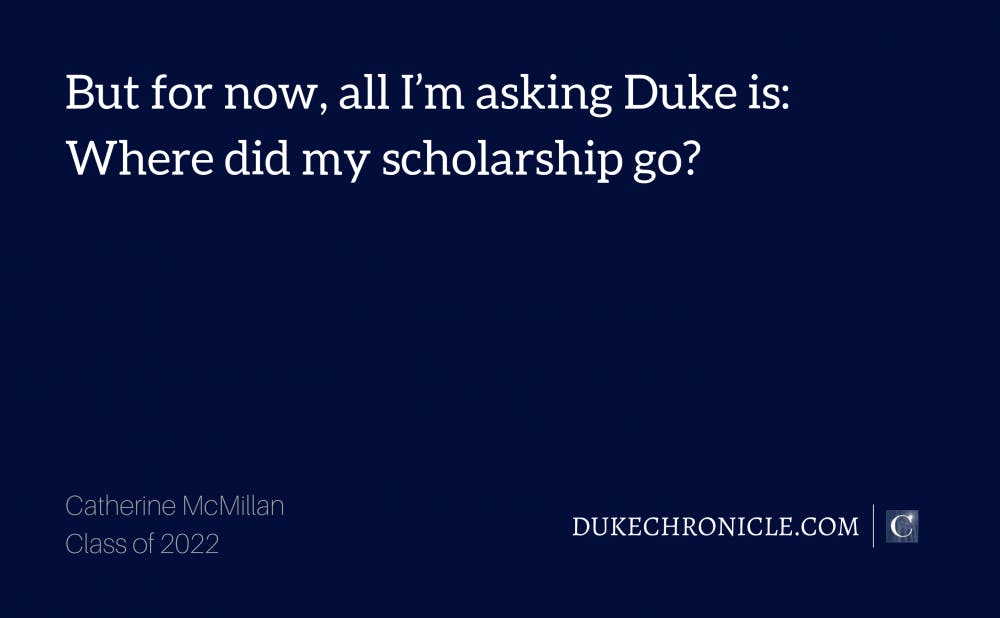Last April, I remember ripping open letters and packages from universities with unmistakable excitement. In spite of the dazzling displays of pomp and propaganda, a realization quickly struck me: college comes with a cost, literally.
To make my Duke dreams a reality, I set out last spring to apply for as many outside scholarships as I could. Incidentally, the monies of just one award surpassed both the offered loans and work study. So, where did the “excess” money go? In short, it replaced a part of my financial aid package because, in the eyes of the University, my “need” (or financial aid) was reduced.
Discourse on financial aid has dominated headlines this year. From questions of university healthcare coverage to the unexpected consequences of taking out hefty loans, students have largely been steering this dialogue. However, one issue that hasn’t gotten the same intense scrutiny thrust upon it is Scholarship Award Displacement.
Implementation of this policy differs by university. Essentially, scholarship displacement is an institution’s redistributive power over student scholarship monies. It’s important to note that outside scholarships that are sent directly to the student or through 529 plan don’t face this obstacle. And students can’t control whether their earnings are sent straight to the university or not. Many universities, including Duke, allow for students to use their earnings to eliminate loans and federal work study offerings. But invariably under this policy, students on financial aid are barred from using outside scholarships to reduce their yearly cost of attendance.
The argument for scholarship award displacement holds that the financial aid office redistributes an ever-shifting lump sum of money in order to maximize financial support for those who demonstrate the institution’s definition of “need.” When a student’s outside scholarship(s) exceeds that of the loan/work-study offerings, the process decreases financial aid, thus freeing up money for other students. With potentially vital financial support at stake for other students, I understand the moral arguments wrapped up in the allocation process. One person’s scholarship displacement (also known as “over-award”) could mean all the difference for another student on need-based aid.
It’s a strange oscillation between the two sides of the displacement debate, which boils down to a matter of individualism vs. collectivism. The primary goal of pursuing outside scholarships is to make the exorbitant price tag of college more affordable on an individual level, whereas the goal of the financial aid budget is to fairly portion out funds so that all admitted students can attend the university.
Understandably, when raising these issues directly with the Financial Aid Office itself, the response is the same: Duke has a policy. Although the premise of displacement is meant to ensure the greatest amount of funds available for students on need-based aid, I do believe that there could be more room for negotiation, particularly with expenses not included in the Expected Family Contribution (EFC).
In assessing a student’s financial aid package, the Financial Aid Office considers “the total costs [they] think a student may incur—billed and unbilled.” However, that does not justify completely undercutting students’ efforts to use their outside aid, such as paying for books.
The total cost of attendance approximates roughly $1,200 for the cost of books/supplies—not pocket change by any means. But under the current policy, students are not incentivized to seek outside aid because it may only lead to a reduction of a grant after loans and federal work study are dissolved. And for scholarships that explicitly stipulate they can be used for textbooks/course costs, students who would have otherwise made Duke-related purchases—textbooks, books, software, and supplies through the Duke Store—cannot access these earned scholarship monies. Students then must pay, in addition to their EFC, a variety of course-related fees.
Scholarship displacement can lead to unintended collateral damage towards student outcomes. I’ve heard stories of students unable to afford the expensive costs of their class materials, resorting to taking pictures of entire textbooks on their phones, or even worse, not being able to use assigned course materials altogether.
According to a statement by President Price, “The broader challenge to university finances has not gone away.” Indeed, tuition has inflated to the extent that without a hefty financial aid budget, private universities would be virtually inaccessible to students from diverse socioeconomic backgrounds. With this perennial rise in cost, it makes sense that students are increasingly seeking outside assistance to help finance their education. This begs a broader question of the accessibility of higher education and the role that money plays in distorting university priorities.
The burden of responsibility should not be forced upon financially dependent students to finance what is essentially a monetary backwash for Duke’s aid packages. Because if Duke truly cared about meeting 100 percent of demonstrated need, then Duke wouldn’t need to leverage its multi-billion dollar endowment’s stringent “terms-of-use” over students.
Now, I don’t pretend to understand the minutiae of allocating aid packages. It’s a mysterious black box to me. But I recognize that the innate complexities connected to financial aid aren’t exclusive to Duke.
Scholarship award displacement plagues students at public and private universities alike (except for Maryland public colleges, which outlawed the practice in 2017). The fact of these policies’ universality doesn’t mean that we shouldn’t challenge or question the status quo. I don’t anticipate policies to change overnight or expect Duke to budge on the issue of reducing EFC anytime soon. Still, I hope for greater transparency, openness and a willingness to discuss the issues on the table between students and administration.
But for now, all I’m asking Duke is: Where did my scholarship go?
Catherine McMillan is a Trinity sophomore. Her column, "the devil's archive," runs on alternate Fridays.
Get The Chronicle straight to your inbox
Sign up for our weekly newsletter. Cancel at any time.

